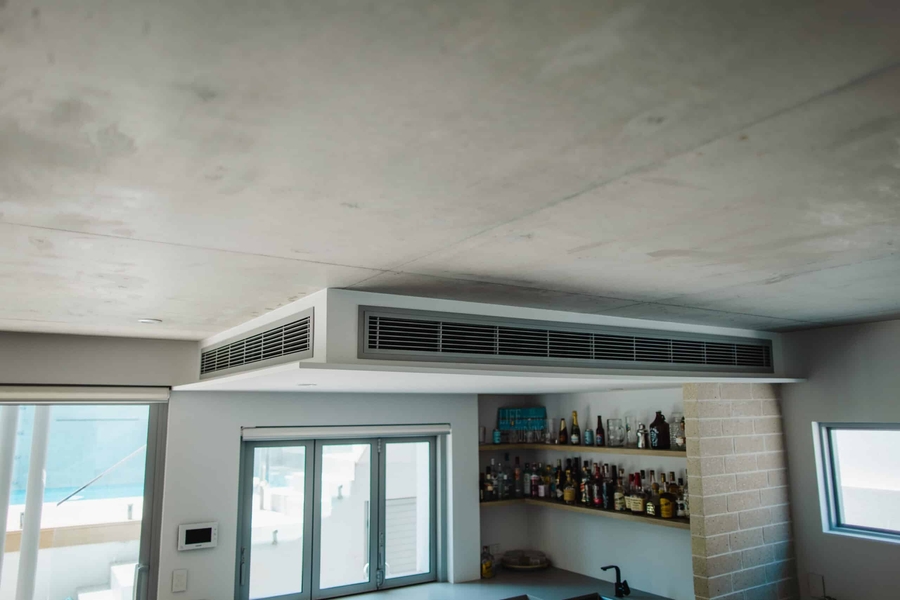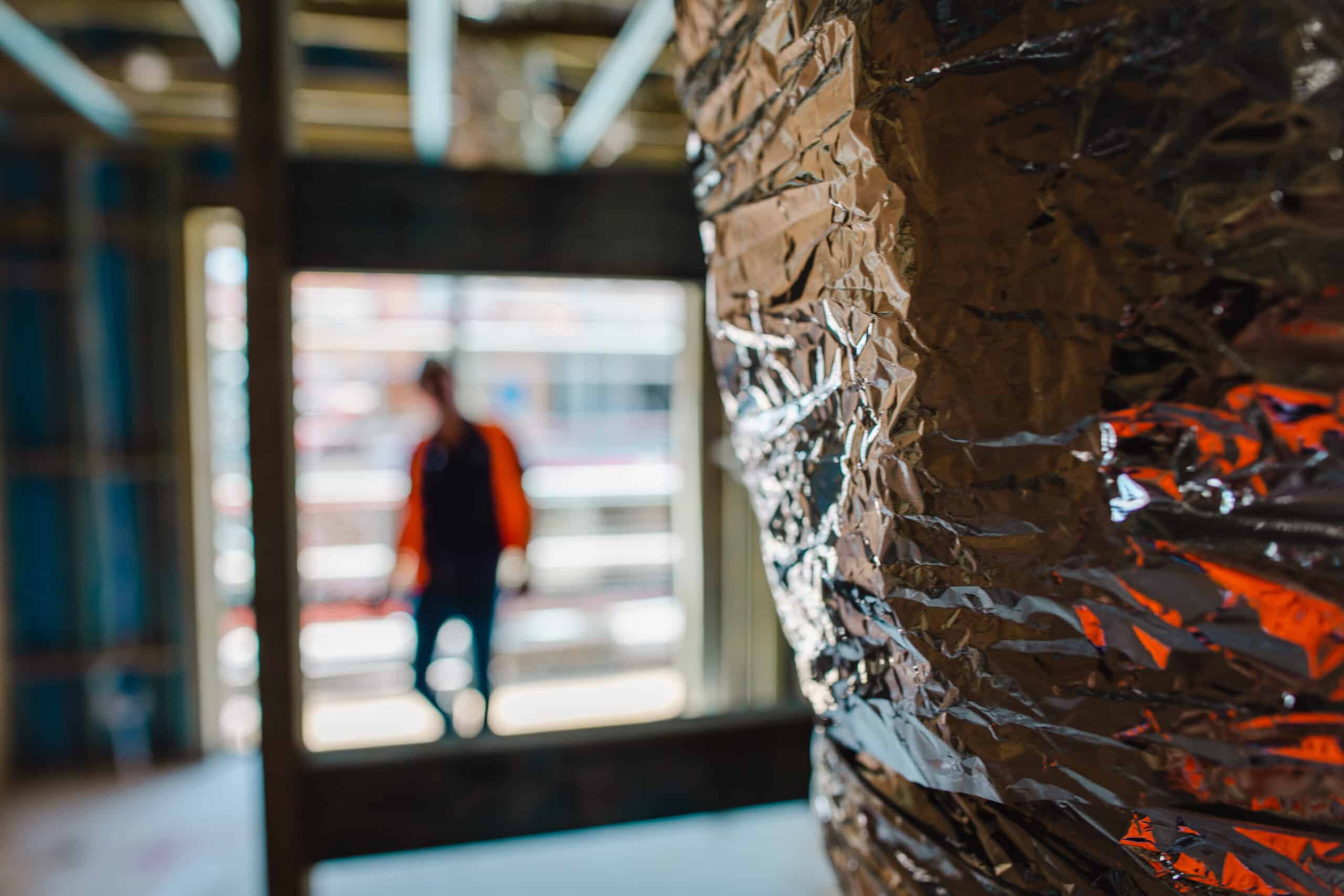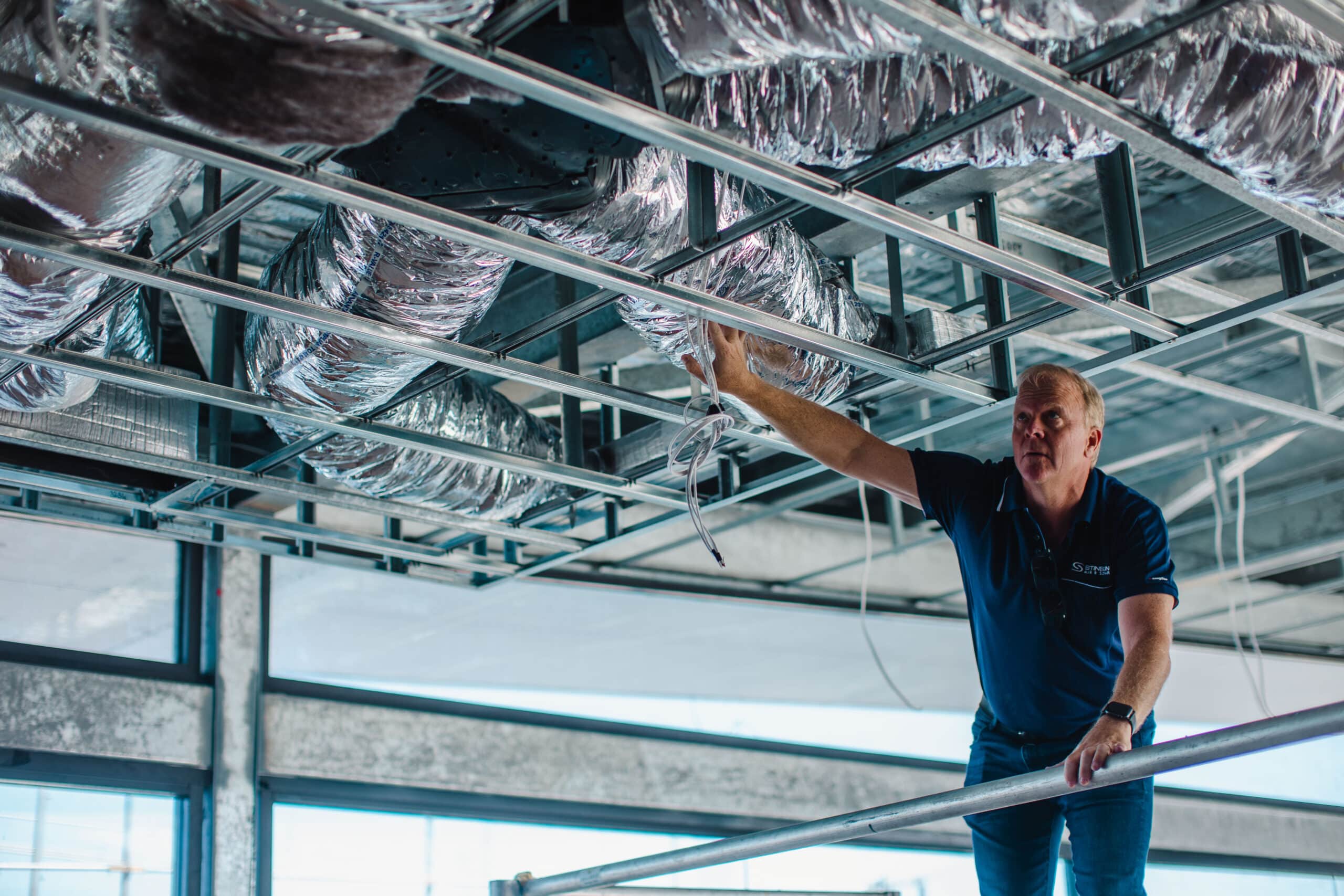Evaporative Cooling vs Refrigerated Air Conditioning

Posted on 23 November 2023
Evaporative Cooling vs Refrigerated Air Conditioning
Are you in the market for a new air conditioner and doing your due diligence by comparing the different options? If so, then you – like many others living in hot dry climates – are probably asking yourself one of the most common questions we hear in our air conditioning showroom; should I be considering an evaporative air conditioning system or a reverse cycle refrigerated air conditioning system? In fact, this question gets asked so often that our air conditioning specialists decided to come together and break it down piece by piece, so that when people like you eventually purchase a new home air conditioning system – whether they are a customer of ours or not – they are certain they made the right choice.
We’ll cover the topics listed below with as little bias as possible:
- The different types of evaporative Air Conditioning Systems.
- The different types of Refrigerated Air Conditioning Systems.
- What is objectively better – refrigerated or evaporative air conditioning?
- What is the difference between refrigerated and evaporative air conditioning systems?
- Why might you choose an evaporative cooling system?
- Why should you choose refrigerated air conditioning?
- Category Showdown: Refrigerated vs Evaporative.
- How to upgrade from evaporative to reverse cycle air conditioning.
The different types of evaporative air conditioning systems
An evaporative cooler works by filtering the hot outside air through wet filter pads causing the moisture to evaporate and cool the air. The evaporative unit then distributes that moist, cool air with powerful fans – lowering the temperatures but increasing the humidity (which is why they are often called swamp coolers).
There are two types of evaporative air conditioning systems, Direct Evaporative and Indirect Evaporative coolers.
-
Direct Evaporative Coolers (Traditional or Passive Evaporative Coolers):
This type of cooler uses the process of evaporation to cool the air. A fan draws warm, dry air into the unit, where a water pump in the cooling unit circulated water over wet pads or a wick. The water evaporates into the air, cooling it down, and this cooled, humid air is then distributed throughout the space. Direct evaporative coolers are most effective in dry, hot climates.
-
Indirect Evaporative Coolers (Two-stage or Active Evaporative Coolers):
This type of cooler also uses evaporation to cool the air, but it does so in two stages. In the first stage, hot air is cooled via evaporation in a heat exchanger. The air cooled in this stage does not come in direct contact with water, so it does not become humid. This cool air is then used to cool the heat exchanger in the second stage, where the main supply of air is cooled without adding humidity. Indirect evaporative coolers are more complex and expensive, but they can provide cooler temperatures than direct evaporative coolers, especially in humid climates.
Also, there are 3 different versions of evaporative coolers:
-
Portable Evaporative Coolers:
These are small, movable units suitable for cooling individual rooms or small spaces.
-
Window or Wall-mounted Evaporative Coolers:
Similar to window AC units, these are installed in windows or wall openings and are good for cooling single rooms or small to medium-sized homes.
-
Ducted Evaporative Coolers:
These larger units connect to the home’s ductwork to cool the entire house. They’re typically installed on the roof or outside the house on the ground level.
The different types of refrigerated air conditioning systems
Refrigerated air conditioning units, also known as reverse cycle air conditioners, rely on the process of refrigeration to cool the air in your home. This process involves absorbing heat from the inside air and expelling it outside, with the cold air being continuously circulated inside your home.
There are primarily two types of refrigerated air conditioning systems; Split systems and central ducted systems.
Split Systems:
Thanks to their ease of installation, affordability, and admirable efficiency, Split Systems are the most common air conditioning system you will find in Australian homes. Their ability to cool individual rooms or zones in your home without the need for complex installation makes them a lot more enticing than their ducted cousin.
A Split System – as the name suggests – is split into two parts:
-
The indoor unit (fan coil unit )
The fan coil unit contains a coil that absorbs heat from the indoor air,
-
The outdoor unit (The condenser).
The condenser dissipates the heat into the outdoor air.
Ducted Air Conditioners:
These larger systems connect to the home’s ductwork to cool the entire house.
A ducted reverse cycle system consists of 5 main components:
-
Indoor Air Conditioning Unit
This unit houses the fan unit that distributes air around the house.
-
Outdoor Unit or Compressor
The size of this unit will be determined based on the size of your home.
-
Ducting
Insulated tubing that delivers the air from the indoor unit to the individual rooms. Poor ducting can mean the heat in your ceiling will make your system work harder.
-
Air Con Diffusers
Diffusers are the vents that deliver air into the rooms. There are many different shapes and sizes to suit the purpose of the room.
-
Zone Control
Zone control is the key to the efficiency of the system. Each room can be controlled independently using dampers so energy is not wasted cooling or heating unoccupied rooms.
What is objectively better – refrigerated or evaporative air conditioning?
The short answer; If you want the best year-round solution to control the air temperature in your home, refrigerated air conditioners will give you the best result. There is no competition.
- If you need heating, you must choose refrigerated / ducted reverse cycle.
- If you live in a dry or mild climate that gets cooler in the winter months, you need heating – an evaporative cooler cannot produce warm air.
- If you live in a humid climate, you are better off choosing refrigerated.
- If you live in a sub-tropical or tropical climate, then you likely have high humidity levels – evaporative cooling is much less efficient in humid climates.
What is the difference between refrigerated and evaporative air conditioning systems?
Refrigerated and evaporative air conditioning systems employ distinctive methods to regulate the temperature of your environment. While refrigerated air conditioning works by extracting heat from the air, evaporative air conditioning operates on the principle of adding coolness to the air through evaporation.
How Refrigerated Systems Work
Refrigerated air conditioning systems work by using a refrigeration cycle involving a compressor and a condenser to remove heat from the air, then redistributing the cooled air back into the space, offering consistent cooling and the ability to set a precise temperature, no matter the climate.
How Evaporative Systems Work
An evaporative air conditioning system cools the air by evaporating water. Warm, dry air is drawn into the system, passed over water-soaked pads, and as the water evaporates, it cools and humidifies the air before it’s circulated back into the room. Evaporative systems are generally more energy-efficient and environmentally friendly but are less effective in humid climates and cannot lower the temperature as much as refrigerated systems can.
Why might you choose an evaporative cooling system?
Similar to many aspects of life, selecting an air conditioner for your home isn’t a straightforward decision, and there are several reasons you might still consider evaporative cooling over more modern air conditioners using refrigeration.
-
Energy Efficiency:
Evaporative coolers can be far more energy-efficient than traditional air conditioners, particularly in suitable climates. In perfect climate conditions, the running costs of an evaporative air conditioning system can be as little as 10% of the running costs of a refrigerated system. The downside is they are nowhere near as efficient in humid climates.
-
Outdoor Use:
Unlike refrigerated air conditioners, evaporative coolers can be used outdoors to cool patios, garages, and other outdoor spaces.
-
Fresh Air Circulation:
Evaporative coolers can also improve indoor air quality by continually circulating fresh air rather than recycling the same air over and over again. They also increase humidity, which can be beneficial in dry climates.
-
Environmental Impact:
Evaporative coolers are considered more environmentally friendly than many other air conditioning options. They use a natural process (evaporation) to cool the air and do not rely on chemical refrigerants, which can contribute to global warming.
-
Personal Preference:
It is always worth noting that some people simply prefer the type of cool, moist air that evaporative coolers produce. It’s a different cooling experience than you get from refrigerated air conditioning systems, and some people find it more comfortable.
Why You Should Choose Refrigerated Air Conditioning
As you know, we recommend you choose a refrigerated air conditioner in all situations. They have too many benefits that cannot be overlooked – here are the most important reasons you should be aware of.
-
You need heating:
If you need heating, you must choose refrigerated air conditioning. Evaporative systems can only reduce air temperatures making them useless in cool climates.
-
You want Consistent Cooling & precise temperature control:
A refrigerated air conditioner will consistently perform in any weather condition, humid or dry, hot or cold. On the other hand, the performance of evaporative systems fluctuates throughout the day as conditions like humidity levels change.
-
You have allergies or respiratory problems:
Unlike evaporative coolers, refrigerated air conditioning systems filter the air for allergens and pollutants making them the best solution for those with allergies or respiratory conditions. This also makes them particularly good in bedrooms where they will improve sleeping conditions.
-
You are looking to air condition an office:
Refrigerated air conditioning systems require less air intake from outside to work efficiently. Evaporative cooling uses a once-through system with zero recycling, meaning they require an equal exhaust and intake of fresh air to work which is not possible in large office buildings with minimal intake points.
-
You live in a humid climate:
Refrigerated air conditioning systems remove moisture from the air as part of their cooling process, making them perfect for humid climates. In contrast, evaporative cooling on the other hand, cools the air by adding water to hot air through evaporation – If the air is already dense with water, this method is ineffective and will likely just blow hot air.
-
You want to heat or cool a large open space:
Refrigerated air conditioners use a process that is not dependent on the size of the space, as it simply cycles air through the system until the desired temperature is achieved. Evaporative coolers cannot recycle air, meaning they require they need to intake and exhaust the entire volume of air in a room, making them very inefficient at cooling larger spaces evenly.
-
You don’t have a water connection available:
Due to their use of refrigerants to cool the air, refrigerated systems do not need a water supply to operate, making them more suitable for a range of applications such as apartment balconies or rooftops.
Category Showdown: Refrigerated vs Evaporative cooling systems
Let’s compare both systems using the most common deciding factors for choosing an air conditioning system; upfront cost, Performance & efficiency, air quality, eco-friendliness, Noise level, Flexibility and maintenance requirements.
Upfront cost:
- Refrigerated AC: Typically, more expensive due to the cost of the units and the complexity of the installation.
- Evaporative Cooler: Less expensive initially and easier to install.
Winner: Evaporative Cooler
If the upfront cost is an issue, evaporative coolers will be far cheaper and easier to install.
Performance & Efficiency:
- Refrigerated AC: Excellent performance in all climates, including humid environments. Generally more efficient in terms of cooling capacity per unit of energy.
- Evaporative Cooler: Performance significantly drops in humid climates. Energy efficiency varies but can be very efficient in dry, hot climates.
Winner: Refrigerated AC
When it comes to performance and efficiency, refrigeration wins due to its year-round performance. While evaporative wins hands down in hot, dry climates, the majority of the Earth’s climates render evaporative cooling ineffective, meaning that the lower running costs are outweighed by their inability to be used for large portions of the year. You can also lower running costs by keeping your reverse cycle AC at 24°C in summer!
Climate Control:
- Refrigerated AC: Offers precise control over the temperature and humidity in the home, regardless of the weather conditions outside or the size of your rooms.
- Evaporative Cooler: Less control over the temperature, and may actually increase humidity levels indoors, which can be less comfortable in already humid conditions.
Winner: Refrigerated AC
There is really no competition between the climate control of each system type, refrigerated out-classes evaporative cooling in every scenario.
Air Quality:
- Refrigerated AC: Filters external air for dust particles and allergens which is ideal for those with allergies or respiratory conditions like asthma. The only downside is they may dry out the air.
- Evaporative Cooler: Constantly brings in fresh outdoor air and adds moisture, which can improve indoor air quality, particularly in dry climates. Won’t filter for dust and allergens
Winner: Refrigerated AC
This is a tough competition, but in most cities and climates the benefit of filtering out dust and pollution in the air far outweighs the benefits of fresh air intake.
Eco Friendliness:
- Refrigerated AC: Uses more energy overall, especially in hot climates, and uses refrigerant gas that, if not properly managed, can harm the environment.
- Evaporative Cooler: Uses less energy and uses water as a natural refrigerant, making it more environmentally friendly.
Winner: Evaporative Cooler
Evaporative coolers use water as a natural refrigerant, meaning minimal greenhouse gas emissions and minimal harm to the environment. Given that you cannot use them in the winter months, and in a summer with low humidity they are incredibly efficient, you will significantly reduce your carbon footprint by choosing an evaporative system.
Noise Level:
- Refrigerated AC: Usually quieter, especially split or ducted systems.
- Evaporative Cooler: Can be noisier due to the fan and water system.
Winner: Refrigerated AC
Thanks to their modern features and efficient technologies – by nature, refrigerated systems will operate quieter than evaporative systems making them the better choice for noise sensitive areas like bedrooms.
Versatility:
- Refrigerated AC: More versatile, can provide both heating and cooling (if a reverse-cycle system is installed).
- Evaporative Cooler: Primarily just cools, limited flexibility.
Winner: Refrigerated AC
This is a category that results in a complete knockout for refrigerated systems as their evaporative counterparts cannot heat.
Maintenance Requirements:
- Refrigerated AC: Generally requires less frequent maintenance, but servicing can be more complex which means you will need to hire a certified HVAC technician to do a full annual service for perfect operation.
- Evaporative Cooler: Requires more regular maintenance to ensure the unit doesn’t become a breeding ground for bacteria. Maintenance usually only requires the simple task of filter and pad cleaning/replacement. You will still need a professional on occasion.
Winner: Tie
When it comes to maintenance requirements, there is no clear winner. With both options requiring an HVAC technician to fully service, it depends on which you value more; less work but more complexity, or more work but less complexity.
Result: Refrigerated AC: 5, Evaporative Cooler: 2, Tie: 1
Overall it is clear that refrigerated systems win in almost all categories, but interestingly it isn’t a slam dunk.
It is still worth looking at each point with your own perspective and set of values, as only then can you know exactly which air conditioning solution is right for you.
How to upgrade from evaporative to reverse cycle air conditioning
At Stinson Air and Solar, we have converted many existing evaporative air conditioning systems to ducted reverse cycle ones. However, it is a little more complicated than you might think. While switching from one system to another is certainly possible and may be worth considering if your current system is not meeting your needs. Be aware, that it involves substantial work and cost but you will likely make those costs back with the added value to your home!
No, You cannot use ducting from your evaporative system for a reverse cycle air conditioning system.
Due to the differences in duct sizing and system configuration, it’s not feasible to use the existing ductwork and sometimes outlets. The ducted reverse cycle system requires smaller ducts to maintain the needed air velocities and has specific zoning requirements, necessitating a unique duct configuration. Similarly, outlet locations may need to be adjusted as the reverse cycle system recirculates air differently than an evaporative system, often requiring outlets near the room perimeter to draw the air back through the room effectively. This conversion process may involve additional costs for installing new outlets, patching ceiling holes, and repainting. If you need more information on this, our team ensures customers are educated about these aspects so they can make an informed decision.
Still need help deciding?
In the end, the choice between evaporative and reverse cycle air conditioning depends on your personal circumstances and preferences. Consider the size and location of your home, the local climate, your budget, and your family’s health.
With all that said and done, if you still need a hand to make the best choice for your home, just give our friendly Stinson Air & Solar team a call. They love helping people like you make the right decision for their home and lifestyle.

